Brits join Canberra in fight to stay ahead of China on AI
As Rishi Sunak seeks the most important technology partnership with Joe Biden, UK security chief Tom Tugendhat stresses closeness to Canberra.
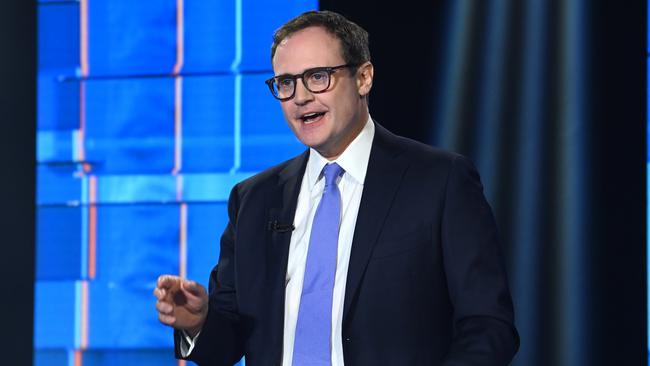
This is because of deep friendship and pressing security needs, and no one knows this or exemplifies it better than British Security Minister Tom Tugendhat.
That moment in 1973 when Britain joined the European Community, with the cold, aloof and uninterested-in-Australia Edward Heath in power in London and the arrogant, vainglorious and ultimately disastrous Gough Whitlam in office in Canberra – two failed short-term prime ministers sympathetic neither to each other nor to the wider world – looked terminal. It seemed the two nations had definitively turned their backs on each other, perhaps forever.
Australia’s economic reliance on Britain was at an end. Whitehall decided Brussels, or perhaps Paris and Bonn, was infinitely more important to it than Canberra.
This led to sometimes exaggerated expressions of disdain from both sides, and for a while Australia developed an unattractive chip on its shoulder regarding Britain. (An echo of this strange quirk came in Foreign Minister Penny Wong’s uncharacteristically misjudged speech in London some months ago.) But in reality the ties between Australia and Britain are as deep as between any two countries anywhere. They grow from shared values, a common democratic culture, much shared popular culture, a surprisingly accurate and deep mutual knowledge, and a people-to-people connection of almost unimaginable intimacy. The democratic pervasiveness of people’s choices ultimately penetrates even formal government policy.
But today, while the relationship is as broad and multifaceted as ever – is there an Australian under 45 who has not been to Britain? One in 10 of Perth’s residents was born in the UK – it is driven at the top by security, military alignment, close co-operation across the most sensitive sectors of government, intense joint effort on counter-terrorism, a common global alignment geo-strategically, and the exchange of security and military technology up to and including nuclear propulsion for submarines. This is, short of nuclear weapons themselves, the most important military technology there is.
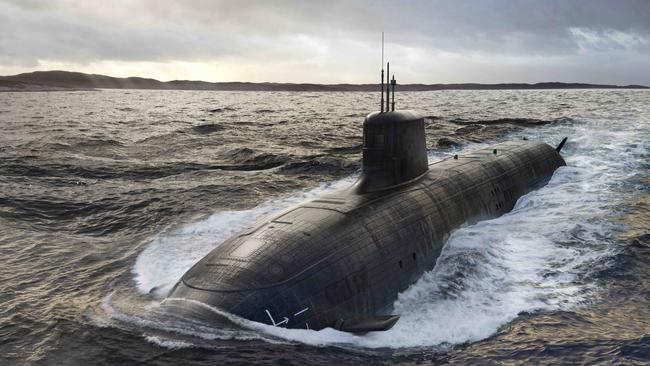
And while the Americans are the critical player in nuclear subs, and the AUKUS agreement generally, they had always said no to Australian requests for nuclear submarine propulsion technology in the past. This time, Canberra got to Washington by going through London. It was partly American concern that we might do a deal entirely with the Brits that moved them to take us on board in the nuclear project.
Now, Britain and Australia are jointly developing the next generation of nuclear-propelled submarines, which both nations will use, while in the meantime Australia buys up to five used Virginia-class boats from the US. But the key takeaway is this: we couldn’t have achieved this result with the Americans without leveraging the Brits.
Tugendhat, who should have been foreign secretary years ago but was effectively blackballed by Boris Johnson when he was prime minister, served in the military in Iraq (where for a time he was under the command of an Australian officer) and Afghanistan; was for five years the highly influential chairman of the House of Commons foreign affairs committee; was a candidate for the Conservative leadership when Johnson stood down last year; and is now the Security Minister. His portfolio sits within the Home Office but he attends the cabinet in his own right.
He tells me the security challenges of today, everything from cyber to China, from terrorism to Russia, from combating people-smuggling to dealing with artificial intelligence, have drawn Australia and the UK closer, operationally and politically.
In that light, the relationship is the opposite of an anachronism, it’s as contemporary an element of globalism as there can be. “For many years we (UK and Australia) have bet correctly that we will remain each other’s best friends and closest partners, through democratic accountability and family relations, not just for the past 100 years but for the next 100 years. We’ve been able to take very, very long-term bets on each other.”
Tugendhat, naturally, is a strong backer of AUKUS and I ask him about the increased tempo of British ship and submarine visits to Australia and to the Southeast Asian and South Pacific regions: “There are very few British ships that do not have an Australian officer on them and very few Australian ships without a British sailor. But it’s not just the ships, it’s the level of partnership underneath that, the level of co-operation between our diplomats, between our politicians, that makes a great deal of difference.”
And in his own portfolio: “The partnership we have with ASIO and ASIS is phenomenal. We are closer than any two countries could be. We operate hand in glove and share to a degree that is remarkable, and that makes us both stronger.”
As a backbencher, Tugendhat was the founder of the China Research Group within the House of Commons and was a key figure in getting the British government to change its mind and ban Chinese telco Huawei from participating in Britain’s 5G network. He has a lot to say about China and he also has a lot of first-hand experience.
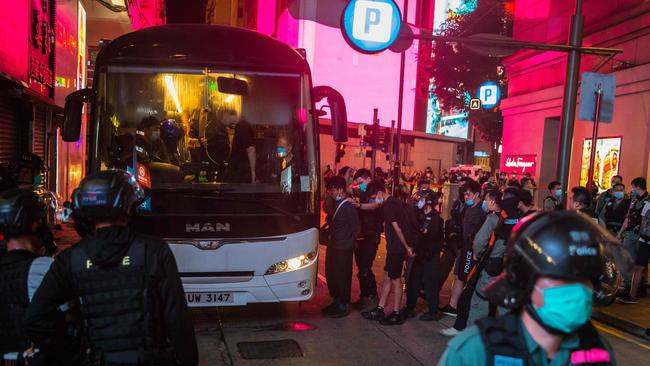
He knows just what it means to be at the wrong end of a foreign disinformation campaign. In 2021 he was formally sanctioned by the Chinese government over alleged “lies and disinformation” he spread against Beijing. This was a result of criticisms he made of Beijing’s policies in Hong Kong. In 2020 he was the victim of bizarre hoax emails that internet companies established had originated in China.
A series of fake press releases and personal emails were sent in his name, announcing strange policy positions and his resignation from various groups. One friend, according to reports at the time, received an email saying Tugendhat was leaving his wife to move in with another man. “It was somebody claiming to be me, and I found out from the company that the email was registered in the People’s Republic of China. It wasn’t sent from my email but it was a variant of my name and made to look like me. It was complete rubbish, nothing to do with me at all. But it was an attempt to discredit me.”
At the time, Tugendhat said he was sure the disinformation campaign against him had some level of Chinese government approval.
All of which helps concentrate Tugendhat’s mind on one of his key responsibilities, cyber security: “Two things are true. We are getting better but they (bad actors) are challenging more. We invest an enormous amount of resources into the National Cyber Security Centre, and into other areas I won’t be discussing. Our defence of our critical national infrastructure is constantly improving, but there are constant challenges as well. One is to make sure that individuals are properly protected. We can’t have areas which are defended but with weak links and gaps left in it.”
One aspect of Russia’s war in Ukraine that surprised Western militaries was Moscow’s inability to wreak cyber havoc on Ukraine, which had been much anticipated.
Says Tugendhat: “The Ukrainians have demonstrated a flexibility (in cyber defence), a dexterity, that is remarkable at any time but particularly in wartime. They’ve been able to constantly change the focus of the Russian cyber actors who have to defend themselves, now perhaps that’s overstating things, but who do have to change their focus in response to the Ukrainians. You see Russian TV stations going down for periods of time.
“There are fantastic Ukrainian cyber defenders, but they’ve also had help from the UK’s National Cyber Security Centre and indeed from partners around the world.
“The partnership with business really matters. Let’s not ignore the fact that Starlink made Ukraine much more resilient because it was satellite based and not wired. It’s not just down to governments but business as well.”
Tugendhat is blunt in identifying states that have been malicious actors in cyber: “Russia, China, Iran and North Korea have sought to use cyber as a way of either undermining Western democracies, or stealing technology, or undermining a position, or just simply stealing money, in North Korea’s case just stealing money in order to keep the regime going to acquire nuclear technology. All four have been very, very heavy cyber actors for extremely negative reasons.”

On one hi-tech challenge, Tugendhat is optimistic that democracies have a headstart, namely AI.
“Authoritarians are going to find AI harder to manage than democracies will,” he says. “Within our systems, democracies have correction mechanisms. We can see what we’ve done, see what works and what doesn’t. It’s much harder for authoritarian states to do that. Authoritarians will not want the challenge to their authority that AI brings.
“This is an area where we not only have an advantage because we’re ahead (technically) but through the way in which our society works, the culture we promote of freedom, open discourse and innovation puts us ahead, so long as we have the right cultures within our relevant organisations.
“I’m not as concerned about other countries. What China has done brilliantly through its social credit scheme is effectively large pattern recognition. That’s not artificial intelligence. It’s just vast pattern recognition. It’s not the same as AI. If you have 1.4 billion people and no concept of privacy, or rather the state has no concept of your privacy, then you have the ability to do things which others cannot.”
Nonetheless, Tugendhat believes AI does pose distinctive challenges to democratic lawmakers. He tends to pooh-pooh exaggerated fears of AI destroying humanity, pointing out that fear of machines destroying the human race have existed for a long time and were acute in the Cold War.
But regulating and managing AI will be difficult: “The reality is this isn’t just a legislative question but a cultural one. It’s not realistic that we can pass laws at the speed of technological invention. We need to make sure we have cultures within companies that are taking on this, which recognise their responsibilities.”

Similarly, AI does enable autonomous weapons systems, which can be very destructive, but it also enhances precise targeting, which should mean there is less excuse for militaries to hit innocent civilian targets: “One of the things Western armies have got much better at is targeting war to affect civilians less. Whereas one of the striking things about Russia’s conflict in Ukraine is the number of civilians they are callously murdering, by using area weapons against civilian targets.”
In some areas, the hi-tech companies have been good citizens, he says, citing the speed with which internet companies take down child sexual exploitation material and their general co-operation with law enforcement in this area.
“But the pressure to go for complete end-to-end encryption is one that is really raising big challenges,” he says.
“British and Australian families rightly have an expectation to a right to privacy. People have the right to a private life. But there’s a difference between privacy and secrecy. Law enforcement must have the ability to protect the most vulnerable, like children. They must do that within the rule of law and the structure of democracy.”
Tugendhat nominates two areas of policy where Britain has borrowed from Australian experience. These are immigration and border security on the one hand, and efforts to protect British society against foreign interference, especially by China, on the other.
He says Britain copied Australia’s points-based immigration policy so it could set a direction and shape the profile of who was coming into the UK long term.
He also says Britain learnt from Australia’s successful efforts to secure its borders against illegal immigration: “What we’re seeing coming through sub-Saharan Africa, through the Sahara Desert, through the Mediterranean and across Europe is a form of exploitation that is utterly horrific. We are seeing individuals trafficked in the most cruel and vicious way we’ve seen in generations. It’s a humanitarian act to stop this crime.
“Look at the statistics of those who’ve died in the crossing of the Sahara, or those who end up in horrific conditions in Libya, or drown in the Mediterranean, to see this is a crime which absolutely cannot stand. Australia quite rightly stopped the boats that were crossing and many people were drowning. Quite rightly, your government didn’t tolerate it. We must be absolutely tough on it, too.”

On efforts to combat foreign interference, Tugendhat says Britain’s Foreign Influence Registration Scheme drew heavily on Australia’s Foreign Agents Registration Act. The main difference between Britain and Australia, he says, is that even more international actors attempt to interfere with British politics than with Australian politics.
“We’re seeing similar things to you,” he says. “We’re a bit more geographically neutral, with a wider range of actors involved. This includes Russia and Iran, and we’re responding to all of it. I’m not saying there’s not a Chinese challenge, there is, but it’s not the same as for you.”
The interaction of foreign interference and AI poses a particular problem for democracies because people need to be able to trust that the figures they are reading or viewing material from on the net are real.
“Curated news is going up in value,” Tugendhat says. “Whatever I think of what you write, I know you are a real person, you have an editor I can write to, there’s a level of accountability.”
In all these areas, Tugendhat emphasises that the co-operation of Britain and Australia, and of course the US, is a force multiplier for all the countries. At a time when Rishi Sunak is visiting Washington to seek an ever closer economic and technological partnership, and when the Australian Strategic Policy Institute has published a report showing China ahead of the US and its allies in a range of military hi-tech, Tugendhat’s message is timely and urgent.
He says: “On AUKUS, people have quite rightly focused on pillar one, the nuclear submarines. But pillar two, the technology-sharing arrangements we are talking about are genuinely game changing.” He wants the AUKUS members to find ways to bring other like-minded nations into the joint project. Japan is the obvious case.
Standing together, like-minded democracies, more now than ever, are vastly more formidable than standing alone.



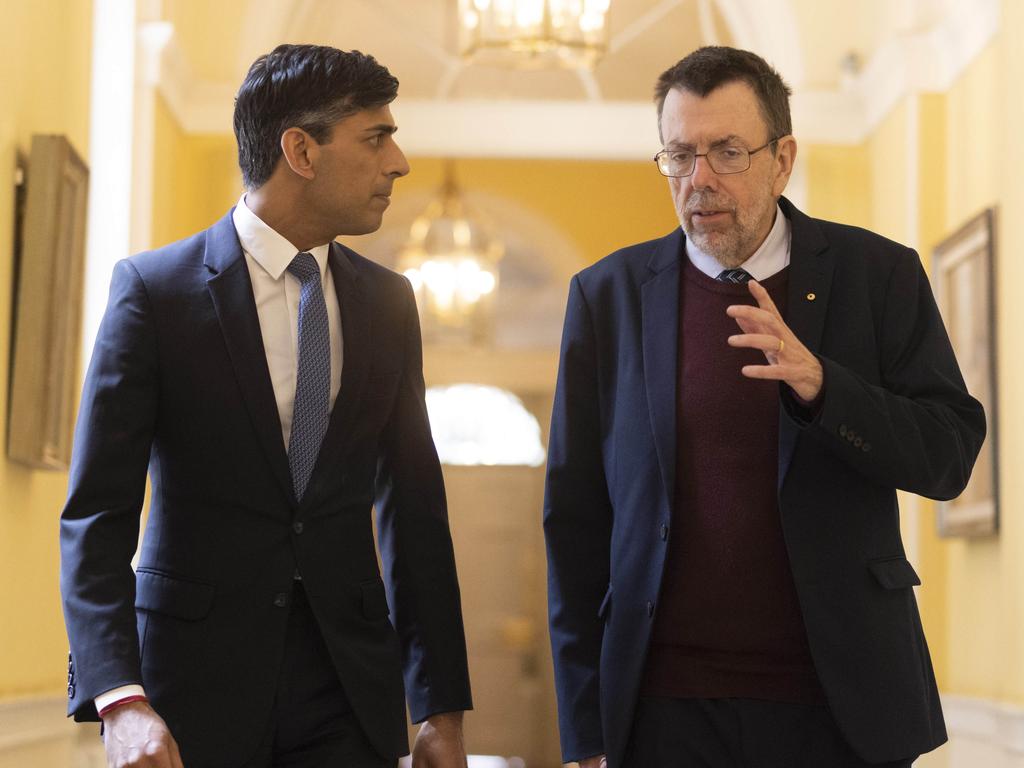
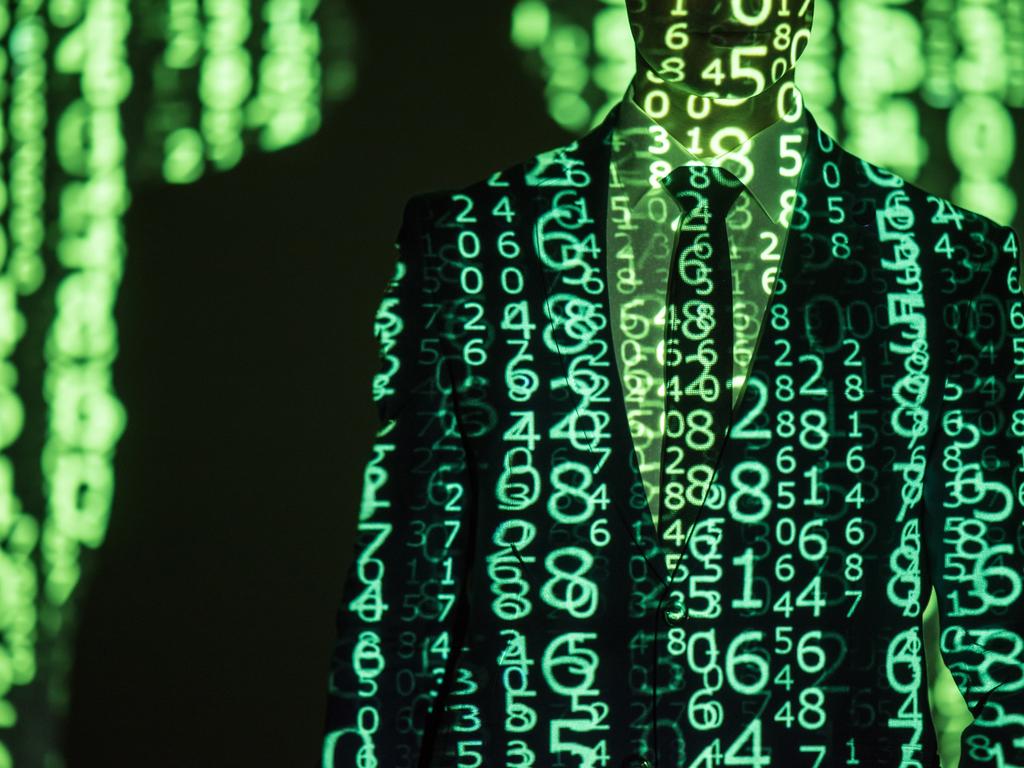
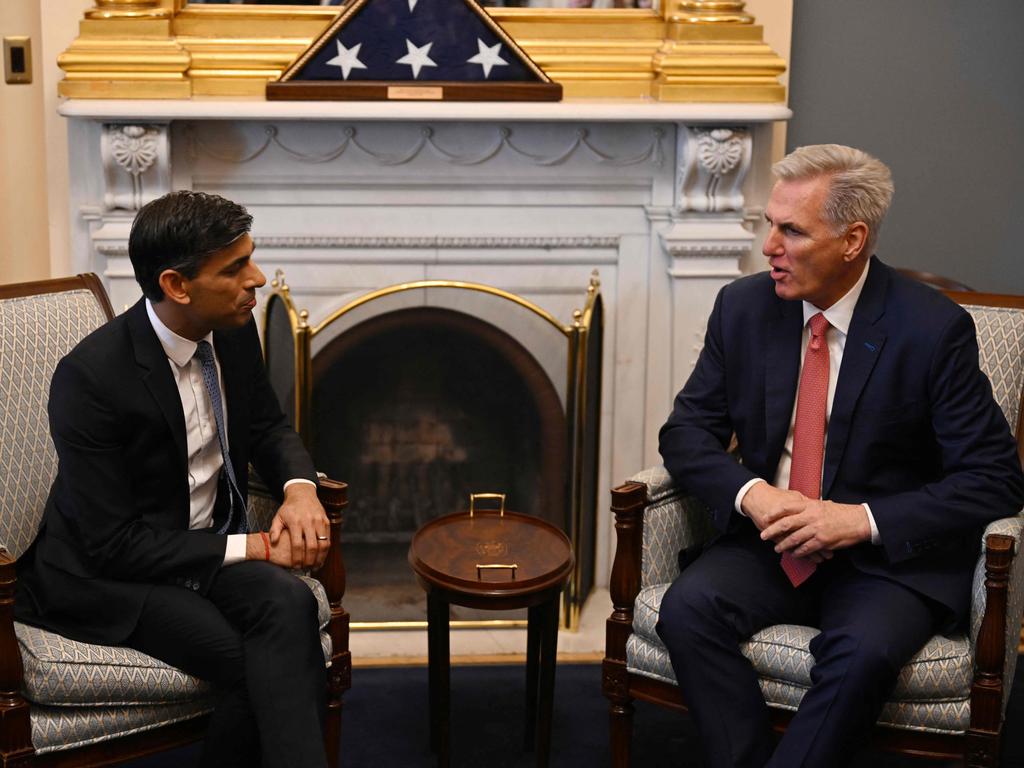


Britain looms larger now for Australia than it has at any time since it first joined in 1973 what later became the European Union.